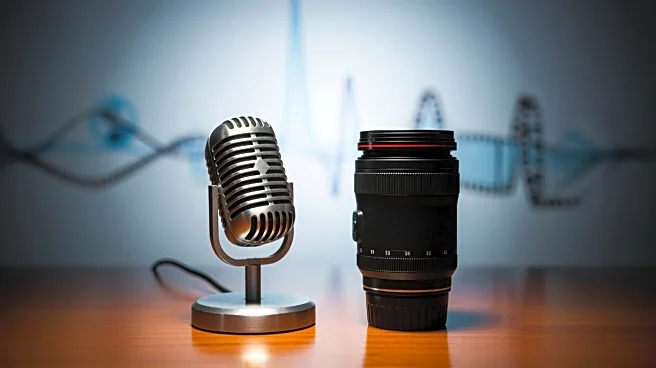What's Happening?
Goalhanger, a company known for producing some of the UK's top podcasts, is undergoing a significant rebranding effort to transform into a media brand. Under the leadership of fractional CMO Stephen Mai, Goalhanger is shifting from being primarily an audio-focused company to a platform agnostic storytelling entity. This transformation includes a full visual refresh and the introduction of video content, which has become increasingly popular among its audience. The rebrand aims to position Goalhanger as a cultural media brand rather than just a podcast production company, reflecting the changing consumption habits of its listeners who now engage with content visually on platforms like YouTube and social media.
Why It's Important?
The rebranding of Goalhanger signifies
a broader trend in the media industry where companies are adapting to the evolving preferences of audiences who favor visual content. This shift could influence how advertisers allocate their budgets, as Goalhanger's ability to command attention through its visual offerings presents new opportunities for brand partnerships. The move also highlights the growing importance of video podcasts, which are becoming a norm in the industry. As Goalhanger transitions to a media brand, it sets a precedent for other podcast companies to diversify their content delivery methods to remain competitive and relevant in a rapidly changing media landscape.
What's Next?
Goalhanger's rebranding is expected to attract more advertisers and expand its audience base, leveraging its new visual identity across its suite of shows. The company plans to continue exploring opportunities to enhance its marketing and branding strategies, potentially leading to further growth and innovation in content delivery. As the media landscape continues to evolve, Goalhanger's approach may inspire other companies to adopt similar strategies, fostering a more dynamic and visually engaging media environment.
Beyond the Headlines
The transformation of Goalhanger from a podcast production company to a media brand raises questions about the future of audio-only content in an increasingly visual world. This shift may prompt discussions about the sustainability of traditional podcast formats and the need for companies to innovate to meet audience demands. Additionally, the role of fractional CMOs like Stephen Mai in driving strategic changes could become more prevalent, offering companies flexibility and expertise without the commitment of full-time hires.














